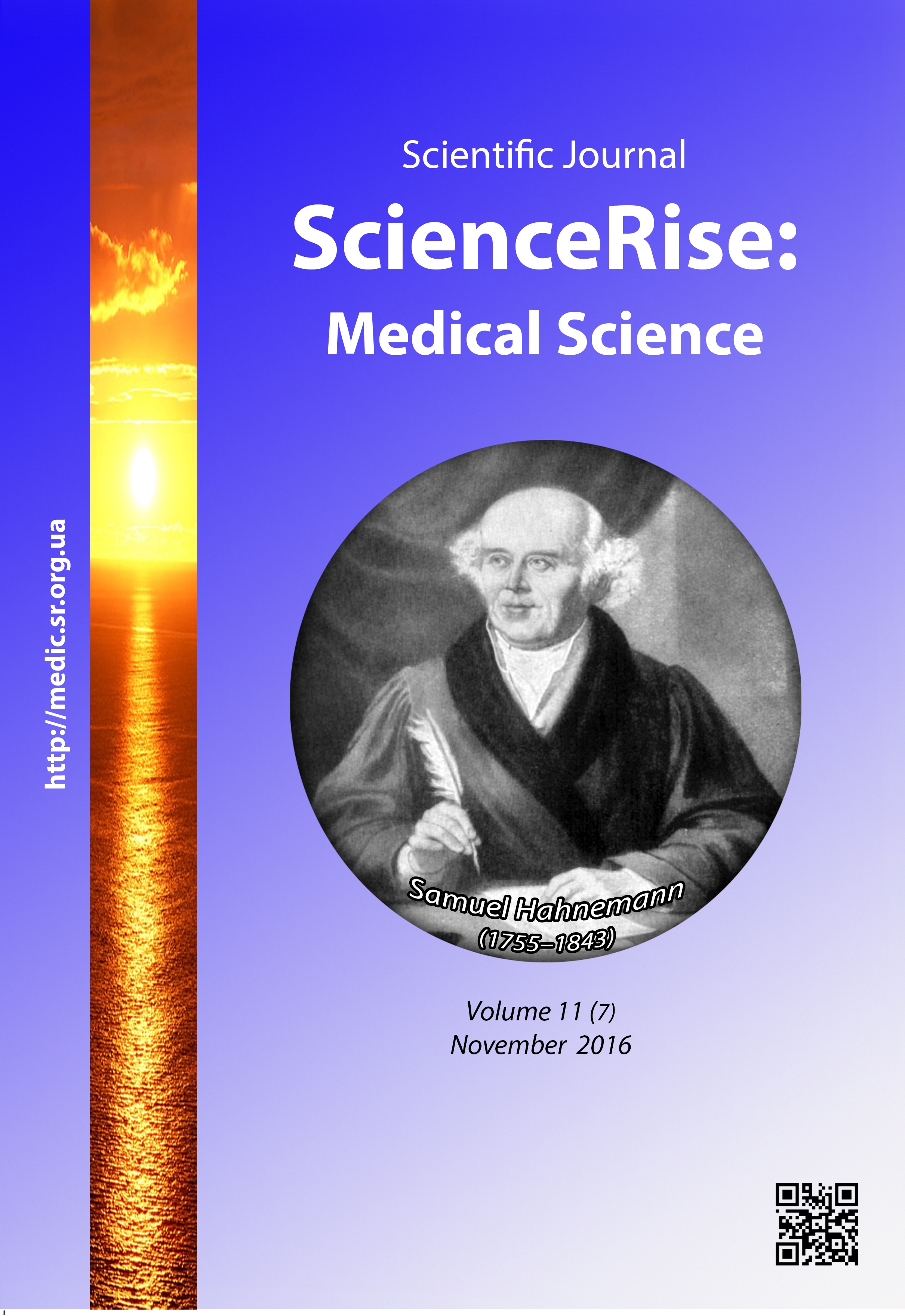Clinical and hemostasiological aspects of the habitual fetal loss syndrome and possible preventive measures
DOI:
https://doi.org/10.15587/2519-4798.2016.84655Keywords:
pregnancy, habitual fetal loss syndrome, hemostasis system, thrombophilia, prophylaxisAbstract
Aim of the work: to determine the changes in hemostasis system and the features of polymorphism of genes, responsible for the state of coagulation system and endothelium in women with habitual fetal loss syndrome for substantiation and elaboration of the treatment-prophylactic complex for them.
Methods of research. The main group included 58 pregnant with habitual fetal loss syndrome (HFLS). The control group included 34 somatically healthy women with physiological course of pregnancy and non-complicated obstetrical anamnesis. Polymorphisms in genes of factor V Leiden 1691 G → A, prothrombin 20210 G → A, fibrinogen β 455 G → A, methylenetetrahydrofolatereductase (MTHFR) 677 C → T were defined by the method of allele-specific polymerase chain reaction. The main parameters of hemostasis system were defined on automatic coagulometer, the level of D-dimer by immune-enzyme method.
Reults. The pregnant with pathologic genotypes and alleles: 1691 G→A FVL, 20210 G→A FII and 677 C→T MTHFR must be related to the risk group of miscarriage development. For these pregnant the hypercoagulation is typical already at the early terms of pregnancy. The assessment of effectiveness of treating arrangements demonstrated, that in the main group in 56 (96,6 %) women pregnancy was finished with delivery (рК>0,05). The term of delivery did not reliably differ in the main group comparing with the control one (рК>0,05) and was 38,0 [36,0–39,0] weeks (C=39,0 [38,0–40,0] weeks).
Conclusions. The study of hemostasis system and the thrombophilia markers allows reveal pregnant with hypercoagulation syndrome that form the group of risk of miscarriage and the use of treating-prophylactic complex significantly improves the results of pregnancy
References
- Bajmuradova, S., Perederjaeva, E., Pshenichnikova, T., Hizroeva, D., Donina, E., Akin'shina, S.; Makacarij, A., Bicadze, V. (Eds.) (2008). Profilaktika povtornykh oslozhneniy beremennosti v usloviyakh trombofilii. Rukovodstvo dlya vrachey [Prevention of repeated pregnancy complications in the conditions of thrombophilia. A Guide for Physicians]. Moscow: Triada-X, 158.
- Sidel'nikova, V. M. (2007). Nevynashivanie beremennosti – sovremennyy vzglyad na problem [Miscarriage – a modern approach to the problem]. Obstetrics and Gynecology, 5, 24–27.
- Carp, H. (2014). Recurrent Pregnancy Loss: couses, contraversies and treatment. Boca Raton: CRC Press, 444.
- Robertson, L., Wu, O., Langhorne, P., Twaddle, S., Clark, P., Lowe, G. D. O. et. al. (2006). Thrombophilia in pregnancy: a systematic review. British Journal of Haematology, 132 (2), 171–196. doi: 10.1111/j.1365-2141.2005.05847.x
- Shamanova, M. B., Gogolevskaya, I. K., Lebedeva, E. G., Kurtser, M. A. (2009). Rol mutatsii v genah FII, FV i MTHFR u patsientok s privyichnyim nevyinashivaniem [The role of mutations in genes of FII, FV and MTHFR in patients with recurrent pregnancy loss]. Reproduction problems, 1, 104–107.
- Rodger, M. A., Betancourt, M. T., Clark, P., Lindqvist, P. G., Dizon-Townson, D., Said, J. et. al. (2010). The Association of Factor V Leiden and Prothrombin Gene Mutation and Placenta-Mediated Pregnancy Complications: A Systematic Review and Meta-analysis of Prospective Cohort Studies. PLoS Medicine, 7 (6), e1000292. doi: 10.1371/journal.pmed.1000292
- Grandone, E., De Stefano, V., Rossi, E., Cappucci, F., Colaizzo, D., Margaglione, M. (2008). Antithrombotic prophylaxis during pregnancy in women with deficiency of natural anticoagulants. Blood Coagulation & Fibrinolysis, 19 (3), 226–230. doi: 10.1097/mbc.0b013e3282f54545
- Clark, P., Walker, I. D., Langhorne, P., Crichton, L., Thomson, A., Greaves, M. et. al. (2010). SPIN (Scottish Pregnancy Intervention) study: a multicenter, randomized controlled trial of low-molecular-weight heparin and low-dose aspirin in women with recurrent miscarriage. Blood, 115 (21), 4162–4167. doi: 10.1182/blood-2010-01-267252
- Vandvik, P. O., Lincoff, A. M., Gore, J. M., Gutterman, D. D., Sonnenberg, F. A., Akl, E., ALansberg, M. G. et. al. (2012). Antithrombotic Therapy and Prevention of Thrombosis, 9th edition: American College of Chest Physicians Evidence-Based Clinical Practice Guidelines. Chest, 141 (2), e637S.
- Kaandorp, S. P., Goddijn, M., van der Post, J. A. M., Hutten, B. A., Verhoeve, H. R., Hamulyak, K. et. al. (2010). Aspirin plus Heparin or Aspirin Alone in Women with Recurrent Miscarriage. New England Journal of Medicine, 362 (17), 1586–1596. doi: 10.1056/nejmoa1000641
Downloads
Published
How to Cite
Issue
Section
License
Copyright (c) 2016 Татьяна Александровна Лоскутова, Наталия Васильевна Давиденко

This work is licensed under a Creative Commons Attribution 4.0 International License.
Our journal abides by the Creative Commons CC BY copyright rights and permissions for open access journals.
Authors, who are published in this journal, agree to the following conditions:
1. The authors reserve the right to authorship of the work and pass the first publication right of this work to the journal under the terms of a Creative Commons CC BY, which allows others to freely distribute the published research with the obligatory reference to the authors of the original work and the first publication of the work in this journal.
2. The authors have the right to conclude separate supplement agreements that relate to non-exclusive work distribution in the form in which it has been published by the journal (for example, to upload the work to the online storage of the journal or publish it as part of a monograph), provided that the reference to the first publication of the work in this journal is included.









